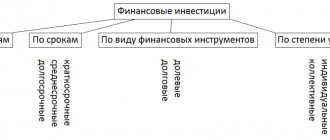You can often hear about direct investment on the Internet and on TV. What is this term? In this article you will learn what direct investment is in simple words. With examples. Plus, we’ll find out where it’s profitable to invest directly today and where it’s definitely not worth investing.
From this article you will learn:
- What is direct investment
- Types of direct investment
- Direct and portfolio investments
- Misclassification of private equity
- Advantages and disadvantages of direct investment
- Instead of conclusions
FINAL TEST
Please mark only one most complete and correct answer.
A foreign investor can be:
foreign citizen. B) a foreign state.
international organization. D) A, B, C are correct.
Characteristics of the Commodity Nomenclature of Foreign Economic Activity:
The first 6 characters correspond to those from the Harmonized System.
B) eight-digit product code.
goods are distributed across 21 sections from I to XXI.
D) is used, in particular, for tariff regulation.
Strategic planning of foreign economic activity includes the following stages:
analysis of the external environment. B) development of a sales plan.
development of company development strategies. D) A, B are correct.
To assess the effectiveness of foreign economic activity the following indicators can be used:
export dynamics. B) dynamics of market share.
profitability of external investments. D) A, B, C are correct.
Characteristics of foreign trade documentation:
consular invoice is a shipping document.
B) certificate of origin of goods - a customs document.
A packing list is a payment and banking document. D) bill of lading - a customs document.
In accordance with the Vienna Convention.
In case of early delivery, the buyer may refuse it. B) a party never has the right to retain the goods.
The parties cannot exclude the operation of the convention in the contract. D) A, B, C are correct.
The exporter of goods benefits from “his” country:
increase in import customs tariff. B) an increase in import quota.
increase in export subsidies. D) A, B are correct.
Reducing import tariffs in global trade is beneficial:
to all manufacturers. B) all consumers.
efficient, successful manufacturers. D) A, B, C are correct.
In accordance with the law on state regulation of foreign trade activities.
the center independently coordinates the foreign economic activity of its subjects. B) foreign entities carry out foreign economic activity in the Russian Federation in accordance with their
Foreign trade insurance can only be provided by a Russian insurer.
D) A, B, C are correct. D) A, B, C are incorrect.
In accordance with the law on state regulation of foreign trade activities.
One of the regulatory tools is the formation of the ruble exchange rate.
B) participants in foreign economic activity can be individuals - individual entrepreneurs.
participants in foreign economic activity can be legal entities. D) A, B, C are correct.
export must be greater than zero.
B) exports must be greater than one.
barter should be more than one. D) correct B, C.
D) A, B, C are incorrect.
Economic effect of foreign trade activities.
is a relative value. B) equivalent to profit.
in export-import operations it is equal to the sum of the economic effects from exports and imports.
D) B, C are correct. D) A, B, C are correct.
When buying and selling on credit.
interest payments on the loan should not be discounted. B) for the borrower, the credit impact ratio must be
for a lender, the credit impact ratio must be greater than one.
D) A, B, C are correct. D) B, C is correct.
Enterprises with foreign investment are characterized by:
A) the board of directors of the joint-stock company elects the executive body and approves the annual reports.
B) the fact that the integral effect of activity is actually discounted revenue. C) A, B are incorrect. D) A, B are correct.
An enterprise with foreign investment can be:
exporter. B) distribution channel.
manufacturer for the domestic market. D) A, B, C are correct.
When concluding and executing contracts it is necessary:
strive for increased requirements for guarantees and risks. B) take into account that the terms of “Incoterms” are always composite
Keep in mind that in case of force majeure, the execution period is extended, but the contract must be fulfilled.
D) A, B, C are correct. D) A, B, C are incorrect.
Features of rental transactions:
One of the reasons for the rapid development of rental is the problem of selling complex, productive, expensive equipment.
B) leasing is a medium-term lease.
ownership during the lease passes to the lessee. D) A, B, C are correct.
Features of some deals:
in a work contract, the subject of the transaction is work.
B) the execution of a purchase and sale contract usually lasts longer than the execution of a work contract.
contracts for operations with customer-supplied raw materials are classified as leasing contracts.
D) A, B, C are correct. D) B, C is correct.
Foreign direct productive investment usually results in:
to increase the donor country's GDP. B) to increase the GNP of the donor country.
to increase the GDP of the host country. D) A, B, C are correct.
The importer of goods benefits:
B) reduction of import customs tariff.
domestic subsidies for import substitution. D) A, B, C are correct.
Fill out the table according to the example given and submit it for verification.
Last name, First name 1 2 3 4 5 6 7 8 9 10 A B D D G C A B D D G C 11 12 13 14 15 16 17 18 19 20 A B D D G C A B D D C 1.
The future of the investment market and promising areas - cryptocurrencies, ICO
Cryptocurrency is digital money, not even virtual, lying in the equivalent of network currency. WebMoney is an online account, like a bank, but investments can be withdrawn from there. Cryptocurrency is the riskiest and most expensive area of investment in terms of profitability. However, it also has a future, especially for large investors who themselves have business in this area.
For the United States, cryptocurrency is a native element; in the CIS countries, it is considered a means of deception and money laundering. Nowadays, ICO is popular - the initial sale of tokens, which serve as trading tools and objects for traders to implement strategies in financial transactions. In China, the currency is growing, but in Russia it is a “gray zone” for which there is no appropriate equipment, laws and regulation of rules.
Therefore, many Internet lovers often come to the markets to get big risky money. In 1-2 minutes you can win a fortune, or you can lose everything you invested. And under the “virtuality” agreement, no one will be held liable for losses. This is a legal, voluntary investment with no justification for risk.
Although official statistics speak only of positive aspects. For example, about 7-8 startups have implemented ICOs on the Waves platform, which now generate income for their founders in the amount of $120 million.
Another project has raised investments worth 7 billion to build a ZrCoin plant that will produce zirconium dioxide. This is a mixed type of deposit, where everyone can give as much as they have and, through common efforts, collect the required amount.
Maybe this is why Russia is now moving to a new technological level, introducing robotics and computer technology to the masses. Perhaps in the future it will be able to reach the same level of countries where cryptocurrency and other types of investments are already on friendly terms with investors. In the meantime, all that remains is to place bets on the innovative future, literally and figuratively.
Portfolio foreign investment
Portfolio foreign investments differ in that they provide the opportunity to participate only in the distribution of profits. Minority participation is characterized by the fact that the investor is not given the right to manage the company. In addition, the share of acquired shares, shares, bonds may in this case be less than 10%.
Subjects of foreign investment in Russian companies can be:
- Foreign companies.
- Foreign citizens.
- Stateless persons living outside of Russia.
- Organizations that have international status and have concluded a corresponding agreement with Russia.
- Any foreign state authorized to invest.
By the way, there is also a division of foreign direct investment according to the type of assets in which funds are invested:
- Financial. Acquisition of securities or foreign monetary assets.
- Real. Investing in a long-term project, in particular the acquisition of production (under construction or already operating) abroad.
- Intangible. Purchase of patents, licenses, trademarks and other intangible assets.
- Private. The investor's funds are invested in objects located outside the country of which the investor is a resident.
- State. Investments are sent abroad by decision of the government of the country that carries out the foreign investment.
- Mixed. Foreign investments by both public and private investors.
On our website you can get comprehensive information about investments. We invite you to act as investors yourself by investing your available funds in various accounts. This will give you the opportunity to earn up to 10% monthly with minimal risks.
Risks arising when attracting foreign investment portfolios
Foreign investors face certain risks:
- When investing in securities of another state, an investor must take into account the instability of the political regime and the imperfection of economic legislation.
- Practice of application of taxation. An investor, before purchasing assets, must study the regulations on taxation of income received from transactions with securities and payment of dividends. In some cases, special regimes are used that provide benefits to foreign investors in order to prevent double taxation. Russia has concluded such agreements with most EU countries.
- Regulation of foreign exchange funds when making cross-border transfers and payments. Investing by purchasing securities of another state is relatively easy. It can be much more difficult to withdraw capital from acquired assets. In this case, careful study of transaction patterns is necessary.
- Information asymmetry (lack of complete information on the issuer that issued the securities), as well as an elementary language barrier. This is relevant when purchasing investment assets off the exchange. To overcome such difficulties, the investor must take into account additional costs for translators, lawyers, etc.
- Forms and rules of operation of brokerage companies in different countries. If an investor is going to acquire assets with their help, he should give preference to those who are licensed by the state, are a member of a professional league or similar community, and operate in a national jurisdiction.
Advantages of foreign (overseas) investment
And yet, despite some risks for the national economy, the advantages of foreign (overseas) investment are obvious:
- can become sources of funds for the introduction of new technologies. Investments allow the use of know-how, modern technologies, innovations in various fields of activity, etc. This significantly increases the efficiency of production processes and facilitates the working conditions of employees;
- Foreign direct investment is an additional source of capital. Thanks to foreign injections, state resources aimed at increasing and updating fixed capital are expanding, the country's economy is growing, competitive goods are being introduced to the market;
- launch of integration processes. Direct foreign investments involve the national economy in the world economy, conducive to obtaining all the advantages of the international division of labor, and the development of favorable niches;
- mastering the experience of functioning of a market economy. Due to the similarity of capital turnover with internationally accepted standards, foreign investment gives an idea of the mechanisms of activity in a market economy;
- favor the improvement of personnel qualifications;
- can replace foreign loans, and at the same time, when using capital, there is no increase in the country’s external debt.
Rational investment
Foreign (overseas) investments play an important role in the development of the economy of any country. An important factor for favorable functioning in the conditions of investment by other countries is state control. Only a competent, deliberate policy that creates a favorable investment climate and at the same time supports its own production will be able to use all the opportunities of foreign capital.
It is necessary to maintain a rational balance between the export and import of capital. Only such a policy will make international financial cooperation beneficial for all parties to the process. It is unacceptable that direct foreign investment in a country resembles economic expansion, in which the national economy of a given state “surrenders” under the pressure of investors.
Order an investment portfolio
Advantages and disadvantages
The main advantages of indirect investments are:
- relative ease of investing - in any brokerage company or investment fund, they will open an account for you and assign a consultant or broker;
- by choosing the right investment fund or brokerage company, the risks of losing investments are reduced;
- domestic indirect investments are controlled by the state, or more precisely, financial institutions engaged in this type of investment are controlled by the state.
The disadvantages include: lack of control on the part of the investor over the processes of using investments; The investor's income level depends on the professionalism of the investment fund management. You will learn about your income from the broker, to whom you are required to pay a commission, regardless of the profitability of your investments managed by this financial institution.
What is direct investment
Direct investment is a special case of the transition of financial investments into real ones. An investor, by purchasing a certain number of shares of an enterprise or organization that requires his participation in the process of managing them, or a controlling stake, turns from a financial into a real investor. These investments made in this way are called direct investments.
In the economic literature, direct investment is understood as the purposeful acquisition of a controlling stake in an enterprise without the presence of speculative motives in such a purchase. This is what distinguishes them from portfolio investments.
The investor intends to manage the enterprise with all the ensuing consequences. A controlling stake may constitute a different share in the authorized capital of an enterprise; it depends on the number of holders of these shares and the distribution of shares between them. Sometimes owning 10% of the shares is enough to obtain a controlling interest, but 50% plus one share gives the unconditional right to manage the enterprise. Direct investments are divided into domestic and international. International direct investment is of particular interest.
Existing classifications
If you talk to several different investors and each of them is asked the question: “What are the types or forms of investments?”, the variety of answers may confuse you. Indeed, they can tell you about direct, portfolio, gross, long-term and primary investments of funds. Moreover, this list can be continued for a long time.
All these types of investments exist. The only question is on the basis of what criteria they are classified in each individual case. It is also necessary to take into account that there is no right and wrong division. All of the following gradations have the right to exist.
Investment classification may be based on the following characteristics:
- object;
- investment goals;
- forms of ownership of investment resources;
- profitability factor;
- origin of the capital used;
- degree of risk;
- liquidity level;
- by urgency;
- accounting forms.
Let's look at the listed types of investment in more detail.
International direct investment
Among the international investments entering the country, direct and portfolio investments are distinguished.
In international practice, direct investment is considered as foreign investment in a country’s economy, directed towards the development of its production potential or service sector. Foreign direct investment is most often received by developing countries, but developed countries are also interested in receiving it. The balance of direct investments received and directed to other countries characterizes the country as a donor or as an importer of direct investments.











